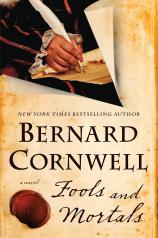Fools and Mortals
Review
Fools and Mortals
There are not quite as many readers as there are people, which is a shame. But there are many different types of readers, and it is not always a good idea to organize them into even rough categories. If you are going to do that, however, one obvious subgroup of readers are those who prefer dialogue and action to description. You will hear some people say, every once in a while, that they hate it when the author spends a lot of time describing things. Elmore Leonard famously advised authors to edit out things that readers tend to skip over, and that primarily means descriptions.
The distaste for description seems to be a modern vice, and I suspect that it may be rooted in technology. In this connected society, you may write about the Iowa plains or the Texas suburban outback or the California coastline and describe it however you wish, but the reader can get a better view of whatever landscape you want to describe through Google Maps, and quicker. This is a blessing and a curse for the contemporary novelist. I can --- and have --- set a scene at some quotidian location, such as the International House of Pancakes by the Atlanta airport, which I can describe with accuracy merely by typing its location into a search engine. This (happily) cuts my travel costs, but it also means that the reader can do the same thing, and correct me where I make a mistake. (I speak from experience; a sharp-eyed reader pointed out that this particular IHOP had coffee warmers at tables, obviating the need for waitresses to stop by with refills, as I had written it.)
"Cornwell has translated his felicity for explaining the nuances of combat to explaining the theatrical experience, and the result is intensely satisfying."
For better or for worse, there were no chain pancake restaurants in Elizabethan England, and there is no comparable database of the sights and sounds and landmarks of Elizabethan London, which means that we are deeply indebted to writers with imagination and the ability to describe the elements of a culture long past. (In contrast, future writers seeking to write about this time period will doubtless have a surfeit of such information; the mind reels.) Bernard Cornwell’s new novel is chock-full of wonderful, vivid descriptions of the highs and lows of 16th-century life, from the palaces of the peers of the realm to the bear-baiting pits, and glories in the delicate clothes of the rich and the pot-shops of the poor.
FOOLS AND MORTALS is a celebration of Shakespeare and the Elizabethan theater, and is full of invention and guile. It needs to be, because so little is known of Shakespeare’s personal life. (Cornwell comes down, hard, against the theory that someone other than Shakespeare wrote his plays.) We know nothing, for example, about Shakespeare’s brother Richard, so Cornwell creates a fictional Richard Shakespeare, who is the narrator and chief mover of the story.
We see Shakespeare exclusively through Richard’s eyes; he always refers to him as “my brother” and does not have any sort of reverence for him, nor is there much need to. Shakespeare here is seen as more of a harassed and harried employer than anything else, having to deal with the endless minutia of casting and blocking and set design, and dealing with the delicate (and indelicate) feelings of actors.
Richard is a young man here, moving out of adolescence and out of women’s parts. He is forever pestering his brother to move into men’s parts (for which Shakespeare has a devilishly inventive response). He is short on rent money (actors, you know) and is forever getting in and out of scrapes.
The choice of Richard Shakespeare as a main character makes perfect sense from a narrative viewpoint, but it does have one curious side effect. One of the signature ways Cornwell builds tension is to spell out the stakes involved --- telling the reader specifically what the main character needs to do, and why. This works out very well for Richard Sharpe and Uhtred the Saxon warrior, but perhaps less well for Richard Shakespeare. The one specific area where the stakes for Richard are exceptionally high --- rescuing the sole copy of a manuscript from a treacherous fellow actor --- is only the case for modern readers who understand what losing that particular manuscript might mean.
Ultimately, though, FOOLS AND MORTALS is more of a celebration of Elizabethan times and the roots of the theater than it is about Richard Shakespeare’s exploits, and should be treated as such. Cornwell has translated his felicity for explaining the nuances of combat to explaining the theatrical experience, and the result is intensely satisfying.
Reviewed by Curtis Edmonds on January 12, 2018
Fools and Mortals
- Publication Date: January 8, 2019
- Genres: Fiction, Historical Fiction
- Paperback: 384 pages
- Publisher: Harper Paperbacks
- ISBN-10: 0062250892
- ISBN-13: 9780062250896




